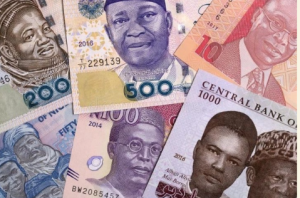
The Nigerian naira has been ranked among the worst-performing currencies in Sub-Saharan Africa for 2024.
This is according to the latest edition of Africa’s Pulse, a report by the World Bank.
The report noted that as of the end of August 2024, the naira had depreciated by approximately 43% year-to-date, positioning it alongside the Ethiopian birr and South Sudanese pound as one of the region’s weakest currencies.
It read: “Ethiopia, Ghana, and Nigeria are among the worst performing in Africa this year, and their currencies continue weakening while demand for foreign exchange remains pressing. Measures to mitigate social unrest associated with the high cost of living in Angola (doubling of the minimum wage) and Nigeria (partially reinstating fuel subsidies) are putting pressure on their public finances.”
High demand for dollar in parallel market
Several factors have contributed to the depreciation of the naira, including a surge in demand for U.S. dollars in the parallel market, limited dollar inflows, and delays in foreign exchange disbursements by the Central Bank of Nigeria (CBN).
The World Bank noted that demand for dollars by financial institutions, non-financial entities, and money managers has intensified pressure on the naira.
“The Angolan kwanza, Malawian kwacha, Nigerian naira, South Sudanese pound, and Zambian kwacha were the worst performing currencies in the region that year. More broadly, the weakening of most African currencies resulted from foreign exchange shortages as export proceeds were subdued and international debt payments increased.
“By August 2024, the Ethiopian birr, Nigerian naira, and South Sudanese pound were among the worst performers in the region. The Nigerian naira continued losing value, with a year-to-date depreciation of about 43% as of end-August.
“Surges in demand for US dollars in the parallel market, driven by financial institutions, money managers, and non-financial end-users, combined with limited dollar inflows and slow foreign exchange disbursements to currency exchange bureaus by the central bank explain the weakening of the naira,” the report stated.
Despite the Nigerian government’s foreign exchange market reforms, including the liberalization of the official exchange rate in June 2023, the efforts have not been sufficient to stabilize the currency.
The naira’s depreciation is symptomatic of Nigeria’s broader economic issues, including dwindling foreign currency reserves and rising inflation.
The report highlights that the currency’s weakening has led to higher domestic prices, especially for imported goods, exacerbating the financial strain on Nigerian consumers.
In contrast, some African currencies, such as the Kenyan shilling and South African rand, which faced challenges in 2023, have shown signs of recovery in 2024.
The Kenyan shilling, for example, strengthened by 21% year-to-date by the end of August, making it one of the region’s top performers.
However, foreign exchange shortages remain a concern for many African economies.
Important Notes:
The devaluation of the naira has intensified inflationary pressures, making imported goods and services more expensive and reducing the purchasing power of Nigerians.
The currency’s decline, coupled with rising fuel prices, has particularly impacted the transportation sector, which relies heavily on imported petroleum products.
Despite fiscal reforms aimed at stabilizing the economy, the World Bank projects that inflation in Nigeria will remain elevated in the coming months.
Despite starting this week with a significant appreciation of over 5%, the naira fell hard on Tuesday as foreign exchange turnover further declines.
According to NAFEM data from FMDQ, the naira significantly depreciated against the U.S. dollar on Tuesday, October 15, 2024, closing at N1,658.97/$1, marking a 6.39% decline from N1,552.92/$1 recorded the previous day on October 14, 2024.
This depreciation was accompanied by a sharp 36.62% drop in foreign exchange turnover, which fell from $343.71 million on Monday to $217.86 million on Tuesday.
The declining FX turnover suggests reduced dollar liquidity in the market, exacerbating the pressure on the naira.
According to Nairametrics reports earlier, the naira plummeted to a new record low, closing at N1,700 per dollar in the parallel market on Monday. This was a 0.29% drop from its previous rate of N1,695/$1 recorded on October 11.
Also, after recording a decrease twice consecutively, Nigeria’s headline inflation rate in September 2024 rose to 32.70%, up from 32.15% in August 2024, marking a 0.55% increase month-on-month.
This was according to the National Bureau of Statistics (NBS) Consumer Price Index (CPI) report which stated that inflation during the month was propelled by increases in transportation costs and food prices.
Sources: Nairamatrics

